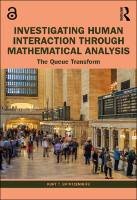Investigating Human Interaction through Mathematical Analysis
Proposal review
The Queue Transform
Abstract
Investigating Human Interaction through Mathematical Analysis offers a new and unique approach to social intragroup interaction by using mathematics and psychophysics to create a mathematical model based on social psychological theories.
It draws on the work of Dr. Stanley Milgram, Dr. Bibb Latane, and Dr. Bernd Schmitt to develop an algebraic expression and applies it to quantitatively model and explain various independent social psychology experiments taken from refereed journals involving basic social systems with underlying queue-like structures. It is then argued that the social queue as a resource system, containing common-pool resources, meets the eight design principles necessary to support stability within the queue. Making this link provides a means to advance to more complex social systems. It is envisioned that if basic social systems as presented can be modeled, then, with further development, more complex social systems may eventually be modeled for the purpose of identifying and validating social structures that might eventually support stable governments in our common environment called Earth.
This is a fascinating reading for academics and advanced students interested in political theory, detection theory, social psychology, organizational behavior, psychophysics, and applied mathematics in the social and information sciences.
Keywords
algebra;crowds;Fechner’s Law;group membership;Milgram;mathematics;Pettigrew;psychophysics;queuing;Social psychology;social dynamics;social group interactions;social impact theory;social space;social structures;social systems;Waiting Lines experimentDOI
10.4324/9781003325161ISBN
9781032350714, 9781032350745, 9781003325161, 9781000790610Publisher
Taylor & FrancisPublisher website
https://taylorandfrancis.com/Publication date and place
2023Imprint
RoutledgeClassification
Algebra
Applied mathematics
Psychology
Psychological methodology
Social, group or collective psychology
Psychological testing and measurement


 Download
Download Web Shop
Web Shop